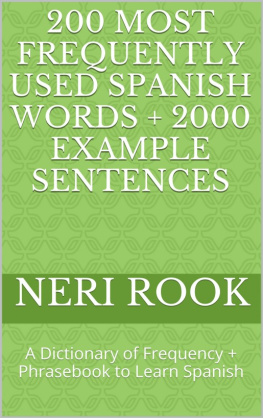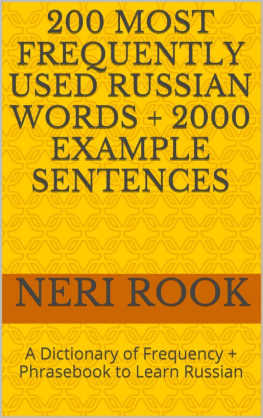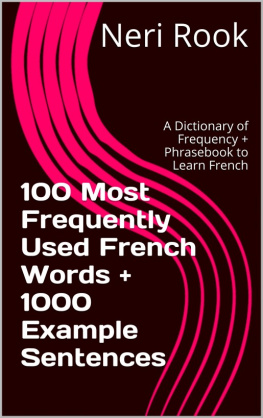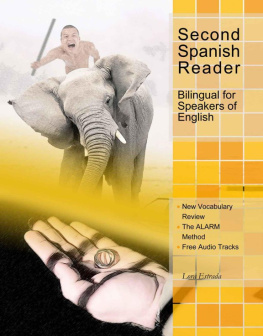200 Most Frequently Used Spanish Words +Over 2000 Example Sentences: A Dictionary of Frequency + Phrasebookto Learn Spanish
Neri Rook
Copyright Neri Rook, 2015 all rightsreserved. No part of this book may be reproduced, scanned ordistributed in any printed or electronic form without permission.Please do not make illegal copies of this book, your support forthe author is appreciated.
Introduction
This book contains the
200 mostfrequently used Spanish words with
many example sentenceseach. Every example sentence
is beginnerlevel. As a general rule, they are ordered from easiest tohardest. Sometimes an example sentence will berepeated, but with an alternate translationso you can look at thesame sentence but from a different angle. Every sentence should be correct.
Just likeevery translation. If you happen to find a mistake, report it to meand Ill fix it immediately. If you could write a review for this book onwhatever site you got it from, I would be eternally thankful foryour feedback (negative or positive). I hope that this book serves as wonderfullearning reference. Neri Rook Personal website: http://frequencylists.blogspot.com.br/
How to Use This Book
1. 2. 2.
Read the example sentences: try to guesstheir meaning and pronunciation. 3. Check the translations to see if you gotthe meaning right. 4. Type the example sentences into GoogleTranslate, then click the "Listen" button, to see if you got thepronunciation right. Repeat it out loud, trying to mimic thepronunciation that you just heard.
Some less popular languages do not have aListen button on Google Translate. If your pronunciation isalready good, skip step 4. In the end of this book, there is anappendix with study hints.
Short Index of Words
[ 1 ] ES [ 2 ] A [ 3 ]DE [ 4 ] QUE [ 5 ] LA [ 6 ] UN [ 7 ] EL [ 8 ] EN [ 9 ] NO [ 10 ] UNA [ 11 ] EST [ 12 ] ME [ 13 ] SE [ 14 ] LO [ 15 ] MI [ 16 ] SU [ 17 ] POR [ 18 ] CON [ 19 ] TE [ 20 ] TU [ 21 ] MUY [ 22 ] AL [ 23 ] QU [ 24 ] LE [ 25 ]TIENE [ 26 ] MS [ 27 ] LOS [ 28 ]GUSTA [ 29 ] Y [ 30 ] LAS [ 31 ] PARA [ 32 ] FUE [ 33 ] HA [ 34 ]PUEDO [ 35 ]TENGO [ 36 ] COMO [ 37 ] SON [ 38 ]QUIERO [ 39 ] ESTA [ 40 ] IR [ 41 ]MUCHO [ 42 ]ESTOY [ 43 ] TAN [ 44 ] DEL [ 45 ] L [ 46 ] ESTE [ 47 ] SER [ 48 ] ALGO [ 49 ]ESTABA [ 50 ] DOS [ 51 ]QUIERE [ 52 ] SABE [ 53 ] ERA [ 54 ] HE [ 55 ] S [ 56 ]PUEDE [ 57 ] HAY [ 58 ] TODO [ 59 ] VA [ 60 ] CASA [ 61 ] NADA [ 62 ]HACER [ 63 ]ESTS [ 64 ]ESTN [ 65 ] HACE [ 66 ] HIZO [ 67 ]HABLAR [ 68 ] POCO [ 69 ] SOY [ 70 ]QUIN [ 71 ] NOS [ 72 ] SUS [ 73 ] BUEN [ 74 ] VER [ 75 ] MIS [ 76 ] SI [ 77 ] BIEN [ 78 ] O [ 79 ] SIN [ 80 ] AQU [ 81 ]ESTAR [ 82 ] DIJO [ 83 ] ESA [ 84 ] HORA [ 85 ]DNDE [ 86 ] YO [ 87 ]USTED [ 88 ] ESE [ 89 ] VIVE [ 90 ] TRES [ 91 ]DEMASIADO [ 92 ]HABLA [ 93 ]PARECE [ 94 ] HAS [ 95 ]LIBRO [ 96 ]ELLA [ 97 ] YA [ 98 ] DA [ 99 ]PERRO [ 100 ] HOMBRE [ 101 ] VOY [ 102 ]PADRE [ 103 ]OTRA [ 104 ] DIO [ 105 ]NUNCA [ 106 ]GUSTARA [ 107 ]TIEMPO [ 108 ] ESO [ 109 ]PUEDES [ 110 ] TUS [ 111 ]TODOS [ 112 ]MEJOR [ 113 ]HECHO [ 114 ] VEZ [ 115 ]QUERA [ 116 ]BUENA [ 117 ]ERES [ 118 ]SIEMPRE [ 119 ]SOLO [ 120 ]TIENES [ 121 ] VI [ 122 ]QUIERES [ 123 ]ESTADO [ 124 ]CASI [ 125 ]GUSTAN [ 126 ]SOBRE [ 127 ]VIDA [ 128 ]TENA [ 129 ]COMER [ 130 ]VISTO [ 131 ]MURI [ 132 ]GRAN [ 133 ] VAS [ 134 ]VINO [ 135 ]SIENTO [ 136 ]SABA [ 137 ]DECIR [ 138 ]NIO [ 139 ] MAL [ 140 ]MUCHOS [ 141 ]TRABAJO [ 142 ]CMO [ 143 ]GATO [ 144 ]PUSO [ 145 ] DA [ 146 ]DEJ [ 147 ]MADRE [ 148 ]NECESITA [ 149 ] NI [ 150 ]AMIGO [ 151 ]HICE [ 152 ]QUEDA [ 153 ]LEER [ 154 ]COCHE [ 155 ]FUERA [ 156 ]HABER [ 157 ]ESTO [ 158 ]NADIE [ 159 ]DIEZ [ 160 ] T [ 161 ]CUANDO [ 162 ]JUGAR [ 163 ]MUJER [ 164 ]ENCANTA [ 165 ]OTRO [ 166 ]TODA [ 167 ]DEBE [ 168 ]HASTA [ 169 ]AGUA [ 170 ]DEBERA [ 171 ]DICE [ 172 ]TAMBIN [ 173 ]AOS [ 174 ] VIVIR [ 175 ] HABA [ 176 ] VE [ 177 ] DIFCIL [ 178 ] AO [ 179 ]NOMBRE [ 180 ]HACIENDO [ 181 ]DINERO [ 182 ]CADA [ 183 ]VECES [ 184 ]SIDO [ 185 ]TREN [ 186 ]SABER [ 187 ]PUERTA [ 188 ]VOLVER [ 189 ]REALMENTE [ 190 ]VIENE [ 191 ]DEJAR [ 192 ] TAL [ 193 ]DIJE [ 194 ]GENTE [ 195 ]ALTO [ 196 ]TOMAR [ 197 ]LLAMA [ 198 ]CREO [ 199 ]CHICO [ 200 ]NUEVO
Index ofWords
[ 1 ] ES Qu eslo que te gusta ? No slo que es. No slo que es. No, noes mi casa.
Es comotiene que ser. Es algoque tengo que hacer. Es algoque tengo que hacer. Todo loque sabe es que sabe. Esta noes mi casa. [ What do you like? ] [ I don't know what it is.] [ I don't know what that is.] [ No, that's not my house.] [ It is how it is. ] [ It's something I have to do.] [ This is something I have to do.] [ All that he knows is that he knows.] [ This is not my home. ] [ Thisisn't your house. ] Eso noes lo que quiero. ] Eso noes lo que quiero.
Es todolo que quiero hacer. Todo loque tengo es un libro. l esel hombre de la casa. Qu eslo que ms quieres ? Es horade ir a casa. Esta esmi casa. Esta esmi casa.
Es portu bien. Estaes su casa ? [ That's not what I want.] [ It is all I want to do.] [ All I have is a book. ] [ He's the man of the house.] [ What is it you want most?] [ It's time to go home. ] [ This is my home. ] [ This is my house. ] [ Is this your house? ] Mi casaes tu casa. ] [ Is this your house? ] Mi casaes tu casa.
Tu casaes mi casa. Nopuedo decir lo que es. Esta estu casa. Eso eslo que quiero. No squ hora es. l noes mi padre.
Dequin es esta casa ? Nada eslo que parece. S ques lo que quieres. [ My home is your home. ] [ Your house be my house.] [ I can't tell what it is.] [ This is your house. ] [ That's what I want. ] [ Who owns this house? ] [ Nothing is as it seems.] [ I know what you want. ] [ 2 ]A Lequiero ms que a nada. ] [ 2 ]A Lequiero ms que a nada.
Mepuedo ir a mi casa ? Tengoque ir a casa. Nopuedo ir a casa. Tequiero ms que a ella. Es horade ir a casa. Mequiero ir a casa. A ellano le gusta.
No squ va a hacer. Me voya mi casa. [ I love him more than anything.] [ May I go home? ] [ I have to go home. ] [ I can't go home. ] [ I love you more than I love her.] [ It's time to go home. ] [ She does not like him. ] [ I don't know what he'll do.] [ I'm going to my house. ] Ya eshora de ir a casa. ] Ya eshora de ir a casa.
A l legusta este libro. No voya tu casa. A ellale gusta l. A ellale gusta l. Ya mepuedo ir a casa ? Tequiero ms que a nadie. Tequiero ms que a nadie.
A ellale gusta. A ellale gusta. [ It's already time to go home.] [ He likes this book. ] [ I'm not going to your house.] [ She likes him. ] [ She loves him. ] [ She likes him. ] [ She loves him. ] Ella sefue a casa. ] Ella sefue a casa.
A l leva bien. No mevoy a ir si no quieres. Separece mucho a su padre. A quhora te vas a casa ? l separece a su padre. Se lodijo a todos. No lepuedo hablar a la gente.
Vaspor l o a por l ? No telo voy a decir. [ She went home. ] [ He is doing well. ] [ I'm not going to leave if you don'twant me to. ] [ He closely resembles his father.] [ What time do you go home?] [ He resembles his father.] [ He told everyone. ] [ 3 ] DE l esel hombre de la casa. ] [ 3 ] DE l esel hombre de la casa.
Es horade ir a casa. Qu tegusta de ella ? No snada de l. No snada de l. No snada de l. No snada de l. Estacasa es de mi padre.
Estoyen la casa de un amigo. S dednde es l. [ He's the man of the house.] [ It's time to go home. ] [ What do you like about her?] [ I don't know anything about him atall. ] [ I know nothing about him.] [ I do not know anything about him.] [ I don't know anything about him.] [ This house is my father's.] [ I am staying with a friend.] [ I know where he comes from.] Ya eshora de ir a casa. S muypoco de l.
Esto estodo lo que s de l. Soy elhombre de la casa. Es horade hacer algo. Noquiero hablar de ella. Eso esde un libro ? Noquiero hablar de mi nio. l esel ms alto de los tres.
De losdos, l es ms alto. [ It's already time to go home.] [ I know very little about him.] [ This is all that I know about him.] [ I'm the man of the house.] [ It's time to do something.] [ I don't want to speak about her.] [ Is that from a book? ] [ I don't want to talk about mychild. ] [ He is the tallest of the three.] [ He is the taller of the two.] Tequiero fuera de mi casa. Quieroms de eso. Es elde mi hermano. l, dehecho, lo hizo. l, dehecho, lo hizo.









